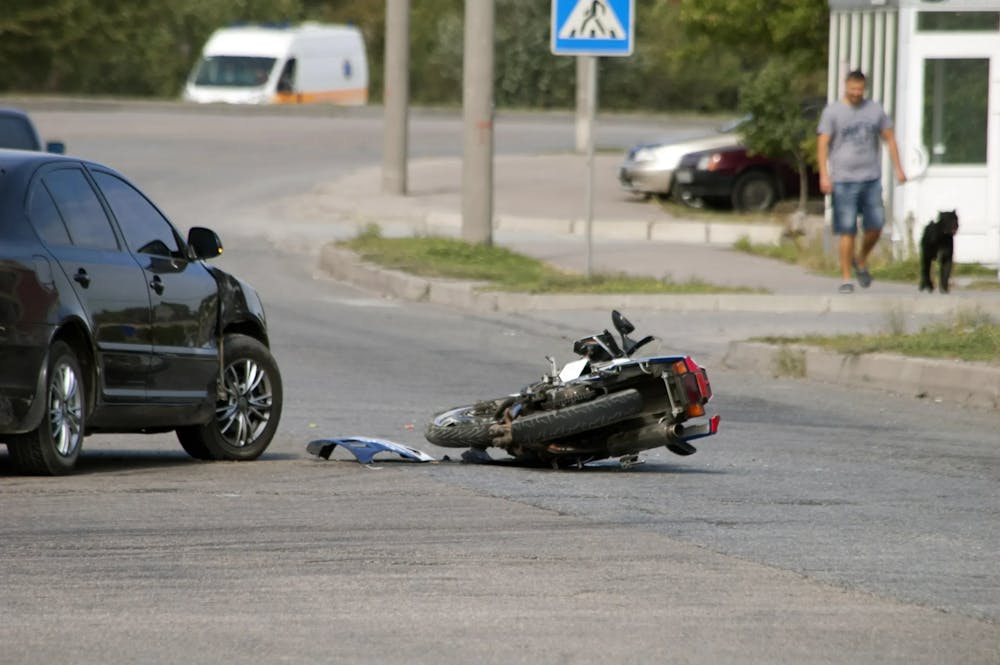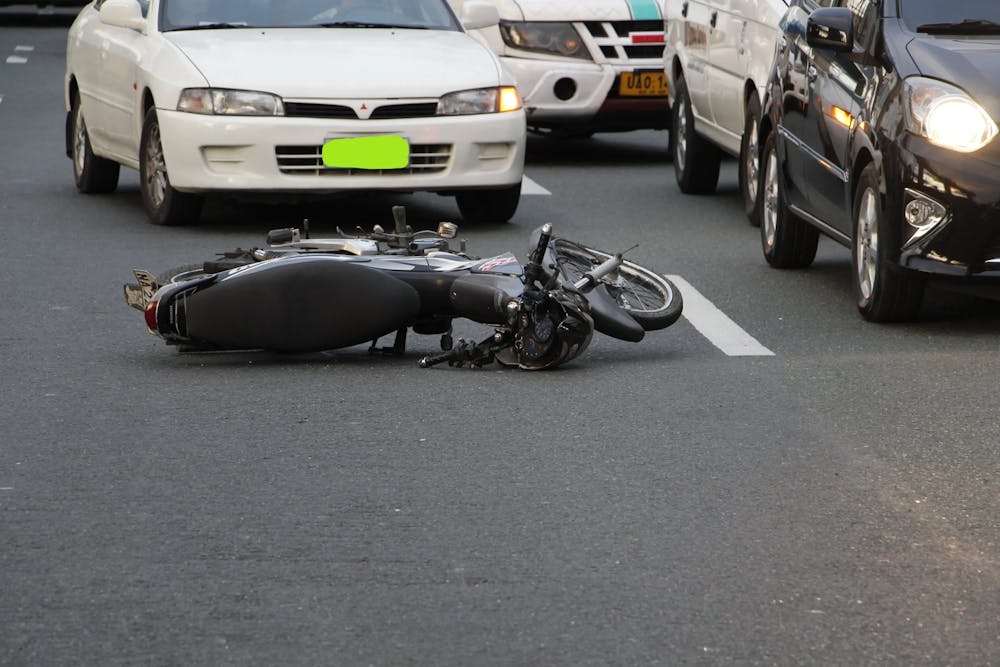Can I Still Receive Compensation If I Wasn’t Wearing a Helmet During a Motorcycle Accident?
 Riding a motorcycle can be exhilarating, but it also comes with risks. Research demonstrates that helmets significantly reduce the risk of head or neck injuries in a motorcycle crash, and not wearing a helmet can lead to severe injuries, and in some cases, even death.This can lead some people to claim that riders who were not wearing helmets are ineligible to recover damages. The good news is, if you were injured in an accident while riding a motorcycle, it is still possible to receive compensation, even if you weren’t wearing a helmet.
Riding a motorcycle can be exhilarating, but it also comes with risks. Research demonstrates that helmets significantly reduce the risk of head or neck injuries in a motorcycle crash, and not wearing a helmet can lead to severe injuries, and in some cases, even death.This can lead some people to claim that riders who were not wearing helmets are ineligible to recover damages. The good news is, if you were injured in an accident while riding a motorcycle, it is still possible to receive compensation, even if you weren’t wearing a helmet.
How Helmets Impact Motorcycle Accidents
There are many misconceptions about wearing a helmet and how it affects a person’s ability to recover compensation in a personal injury claim after a motorcycle accident.Some riders believe that if you did not wear a helmet it will automatically disqualify you from making a claim, while others think that helmet usage is technically irrelevant in such cases.The Impact of Helmets on Injuries
 Motorcycle crashes can result in a wide range of injuries, from minor road rash to severe and life-altering traumas. It is true that when a rider is wearing a helmet, the risk of traumatic brain injuries, skull fractures, or fatal head injuries is substantially reduced.Motorcycle helmets can also protect riders from facial injuries, particularly those with a full face shield. Motorcycle riders who do not wear helmets are at a higher risk of sustaining severe head injuries, broken bones, and spinal cord injuries in the event of an accident.Wearing a helmet also significantly reduces the risk that the motorcycle rider will sustain head or neck injuries.
Motorcycle crashes can result in a wide range of injuries, from minor road rash to severe and life-altering traumas. It is true that when a rider is wearing a helmet, the risk of traumatic brain injuries, skull fractures, or fatal head injuries is substantially reduced.Motorcycle helmets can also protect riders from facial injuries, particularly those with a full face shield. Motorcycle riders who do not wear helmets are at a higher risk of sustaining severe head injuries, broken bones, and spinal cord injuries in the event of an accident.Wearing a helmet also significantly reduces the risk that the motorcycle rider will sustain head or neck injuries.
The Impact of Helmets on Personal Injury Claims
When it comes to personal injury claims, however, the role of motorcycle helmet use is not always so straightforward.While it is true that wearing a helmet can reduce the chance of a head injury and potentially strengthen a claim, not wearing one does not automatically mean you cannot pursue compensation.Understanding Helmet Laws
Helmet laws vary from state to state. Texas state law requires all riders and passengers under the age of 21 to wear a motorcycle helmet.Riders over the age of 21 are required to wear a helmet unless they have completed a motorcycle operator training course or have medical insurance that will cover up to $10,000 in injuries.If you were legally required to be wearing a helmet, not wearing a helmet could mean fines and penalties, as well as potentially affect the outcome of your accident claim.Your insurance company may also view the failure to wear a helmet as a form of negligent behavior, which could impact the damages you may be eligible to receive.Understanding both insurance considerations and Texas law is essential to navigating the claims process effectively.Helmets and Comparative Negligence
 This type of negligence is a legal concept used in many personal injury cases to determine a claimant’s fault amounts for an accident. Under this principle, the injured party’s recovery is reduced by the percentage of their fault for the incident.Texas employs a modified form called “proportional responsibility.” This means that if you are partially at fault for an accident, your compensation may be reduced proportionally based on your contribution to the accident.
This type of negligence is a legal concept used in many personal injury cases to determine a claimant’s fault amounts for an accident. Under this principle, the injured party’s recovery is reduced by the percentage of their fault for the incident.Texas employs a modified form called “proportional responsibility.” This means that if you are partially at fault for an accident, your compensation may be reduced proportionally based on your contribution to the accident.
Not Wearing a Helmet May Impact Fault
In Texas, not wearing a helmet may be considered negligent behavior. This can impact who is determined to be at fault in a motorcycle accident claim.If an insurance adjuster can prove that your injuries were worsened because you did not wear a helmet, you may be assigned a percentage of fault. This may reduce the amount of compensation you are awarded, as your recovery could be limited by contributory negligence.Comparative Negligence in Motorcycle Accidents
Imagine a scenario in which a motorcycle rider without a helmet is involved in an accident caused by other drivers. The other driver is found to be 80% at fault for the accident, while the motorcyclist is assigned 20% fault for not wearing a helmet.In this case, the motorcyclist’s compensation will be reduced by 20%, reflecting their share of the responsibility for the accident.How to Seek Compensation After an Accident Without a Helmet
One of the most crucial steps when you need to recover money after a motorcycle accident is gathering and preserving evidence. This may mean obtaining a copy of the police report, taking photos of the accident scene or your injuries, and collecting contact information from witnesses.This evidence can help establish the other driver’s fault and demonstrate the extent of your injuries, even if you were not wearing a helmet when the accident occurred.Seeking Medical Treatment and Documentation
Following a motorcycle accident in which you were injured, it is essential to seek treatment as soon as possible. Not only does this ensure your well-being, but it also provides medical evidence of your injuries, which can be critical in supporting your insurance claim and helping you recover damages.Be sure to keep all medical records, invoices, and reports, as they can serve as evidence of the severity of your injuries and the expenses you have incurred as a result.Negotiating With Your Insurance Company
When filing a claim, it’s essential to think about insurance considerations, such as policy limits and coverage, which may affect the claimant’s recovery for damages, such as a head injury, back injury, or other sustained harm.By choosing to wear a helmet, motorcyclists can not only protect themselves from severe injuries but also avoid limitations that might be imposed on their claims due to the perception of negligent behavior.Working With a Personal Injury Attorney
 Dealing with your insurance company can be challenging, particularly when you do not wear a helmet. Insurance adjusters may argue that your lack of helmet usage contributed to your injuries and reduced your right to compensation. Hiring an attorney with experience in making an accident claim can significantly increase your chances of receiving a fair settlement. An experienced motorcycle accident attorney can help you negotiate with your insurance company and navigate the complexities of comparative negligence and state law, ensuring that your case is presented effectively. To ensure justice in your case, it is vital to consult a knowledgeable attorney who can navigate the law and effectively represent your interests against the other party as soon as possible. If you have been injured in an accident, Call Gutierrez Accident Injury Lawyer at 979-271-5338 to schedule your free consultation today.
Dealing with your insurance company can be challenging, particularly when you do not wear a helmet. Insurance adjusters may argue that your lack of helmet usage contributed to your injuries and reduced your right to compensation. Hiring an attorney with experience in making an accident claim can significantly increase your chances of receiving a fair settlement. An experienced motorcycle accident attorney can help you negotiate with your insurance company and navigate the complexities of comparative negligence and state law, ensuring that your case is presented effectively. To ensure justice in your case, it is vital to consult a knowledgeable attorney who can navigate the law and effectively represent your interests against the other party as soon as possible. If you have been injured in an accident, Call Gutierrez Accident Injury Lawyer at 979-271-5338 to schedule your free consultation today.
There are many factors that are considered when preparing a case for a client injured in a motorcycle accident. Showing that the other driver was at fault is critical to a successful outcome. We can investigate your personal injury claim, look for evidence to support your claim, interview witnesses, and consult with experts, as needed, to prepare your case for settlement negotiations or trial in Bryan or College Station.
Get a free case evaluation

